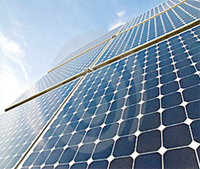
Lawsuits and legislation are top of mind for the green building sector.
At the recent Greenprints conference on sustainability, Georgia Tech’s Baabak Ashuri joined thought leaders to pinpoint key trends in green building in the year ahead. With Ken Edelstein, author of Greenbuilding Chronicle, Steve O'Day, partner in Smith, Gambrell & Russell and Anita Anand, senior associate at Reznick Group, Ashuri provided expertise in what growth trends, financing options and the competitive environment for companies operating in the green building sector.
Ashuri says one of the key takeaways for the panel is that lawsuits are a rising risk for green building projects—that the variations on potential disputes are endless. The architect, builder, commissioner, owner or tenant might be the plaintiff or the defendant suing over promises of cleaner air, energy efficiency, water conservation, certification or even promises of tax credits.
Another key topic was the potential effects of federal legislation. If a change to the tax code proposed by President Obama is approved this year by congress, energy efficiency would be ripe for real estate investment trusts (REIT) that could throw far more capital at energy-saving retrofits of commercial buildings. And, unlike some of the energy spending backed by the administration, this proposal doesn’t seem to have unyielding opposition. After all, it’s a tax cut!
Ashuri says audiences seemed to struggle with the complexity tax cuts and other government benefits for green buildings. In addition, performance risks of green technologies and legal challenges of preparing green building contracts seem to be of greatest concern.
He recommends two resources for alumni or local practitioners who missed the panel:
- Green Building Chronicle is a news organization dedicated to informing and empowering the green development, design and construction community in the Southeast United States. Readers are builders, planners, advocates, architects, educators, suppliers and anyone else engaged in environmentally sound construction, particularly in this region.
- The Database of State Incentives for Renewable Energy (DSIRE) is a comprehensive source of information on state, local, utility and federal incentives and policies that promote renewable energy and energy efficiency. Established in 1995 and funded by the U.S. Department of Energy, DSIRE is an ongoing project of the N.C. Solar Center and the Interstate Renewable Energy Council.
The annual Greenprints conference on sustainability brings together building design and construction professionals, policy makers, building owners, academics and members of the media to learn innovative new approaches to energy-, water- and resource-efficient building and community design.